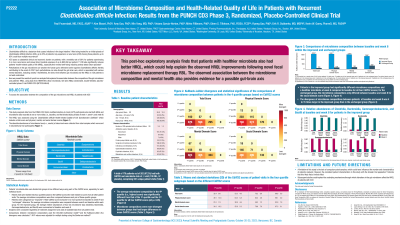Monday Poster Session
Category: IBD
P2222 - Association of Microbiome Composition and Health-Related Quality of Life in Patients With Recurrent Clostridioides difficile Infection: Results From the PUNCH CD3 Phase 3, Randomized, Placebo-Controlled Clinical Trial
Monday, October 23, 2023
10:30 AM - 4:15 PM PT
Location: Exhibit Hall

Has Audio

Paul Feuerstadt, MD, FACG
PACT Gastroenterology Center and Yale School of Medicine
Hamden, Connecticut
Presenting Author(s)
Paul Feuerstadt, MD, FACG1, Ken Blount, PhD2, Amy Guo, PhD3, Min Yang, MD, PhD4, Viviana García-Horton, PhD5, Mirko Fillbrunn, PhD4, Glenn Tillotson, PhD6, Yipeng Gao, PhD4, Erik Dubberke, MD, MSPH7, Kevin W. Garey, PharmD8
1PACT Gastroenterology Center and Yale School of Medicine, Hamden, CT; 2Ferring Pharmaceuticals, Roseville, MN; 3Ferring Pharmaceuticals, Parsippany, NJ; 4Analysis Group, Inc., Boston, MA; 5Analysis Group, Inc., New York, NY; 6GST Micro, North, VA; 7Washington University School of Medicine, St. Louis, MO; 8University of Houston College of Pharmacy, Houston, TX
Introduction: Gut microbiome perturbation plays an important role in recurrent Clostridioides difficile infection (rCDI), which substantially reduces patients’ health-related quality of life (HRQL). This study explored the association between microbiome composition and HRQL by comparing gut microbiome profiles of patient groups with different levels of HRQL using data from REBYOTA’s (fecal microbiota, live-jslm [RBL]) phase 3 PUNCH CD3 trial (NCT03244644).
Methods: The CDI-specific C. difficile Quality of Life Survey (Cdiff32) (total, physical, mental, social domain scores) and counts of gut microbiome taxa at class level were collected at baseline and weeks 1, 4, and 8. Data were analyzed in two ways for each Cdiff32 score. First, microbiota data from all visits regardless of treatment were divided into quartiles based on Cdiff32 score and average microbiome profiles were compared pairwise between quartiles. Second, patients were categorized as improved if Cdiff32 scores improved ≥ 10 points from baseline to week 8, unchanged otherwise. Average microbiome profiles were compared between baseline and week 8 within the improved and unchanged groups, respectively. All comparisons used the Dirichlet-multinomial model and differences were quantified via the Kullback-Leibler divergence.
Results: A total of 176 out of 262 (67.2%) patients had Cdiff32 and microbiota data, comprising 501 unique data points (145 baseline, 144, 110, 102 at week 1, 4, 8; 69.2% RBL, 30.7% Placebo). The microbiome composition in the highest Cdiff32 score quartile (4th) was significantly different from most other groups with lower scores. Divergence between groups was smaller when average Cdiff32 scores were more similar (Table 1, Figure 1). Patients in the improved group had significantly different microbiome profiles between baseline and week 8 for all Cdiff32 scores; in the unchanged group, only for social domain score. Divergences within the improved group were 4 to 15 times larger than within the unchanged group. Patients in the improved group had healthier microbiota at week 8 vs baseline with higher relative abundances of Bacteroidia and Clostridia and lower Gammaproteobacteria and Bacilli.
Discussion: Our study found that patients with better HRQL had healthier microbiota, which points towards a direct link between microbiome and patient well-being in rCDI. This link could help explain the improvement in patient well-being observed after treatment with biotherapeutic products such as RBL that may restore the gut-brain axis.

Disclosures:
Paul Feuerstadt, MD, FACG1, Ken Blount, PhD2, Amy Guo, PhD3, Min Yang, MD, PhD4, Viviana García-Horton, PhD5, Mirko Fillbrunn, PhD4, Glenn Tillotson, PhD6, Yipeng Gao, PhD4, Erik Dubberke, MD, MSPH7, Kevin W. Garey, PharmD8. P2222 - Association of Microbiome Composition and Health-Related Quality of Life in Patients With Recurrent Clostridioides difficile Infection: Results From the PUNCH CD3 Phase 3, Randomized, Placebo-Controlled Clinical Trial, ACG 2023 Annual Scientific Meeting Abstracts. Vancouver, BC, Canada: American College of Gastroenterology.
1PACT Gastroenterology Center and Yale School of Medicine, Hamden, CT; 2Ferring Pharmaceuticals, Roseville, MN; 3Ferring Pharmaceuticals, Parsippany, NJ; 4Analysis Group, Inc., Boston, MA; 5Analysis Group, Inc., New York, NY; 6GST Micro, North, VA; 7Washington University School of Medicine, St. Louis, MO; 8University of Houston College of Pharmacy, Houston, TX
Introduction: Gut microbiome perturbation plays an important role in recurrent Clostridioides difficile infection (rCDI), which substantially reduces patients’ health-related quality of life (HRQL). This study explored the association between microbiome composition and HRQL by comparing gut microbiome profiles of patient groups with different levels of HRQL using data from REBYOTA’s (fecal microbiota, live-jslm [RBL]) phase 3 PUNCH CD3 trial (NCT03244644).
Methods: The CDI-specific C. difficile Quality of Life Survey (Cdiff32) (total, physical, mental, social domain scores) and counts of gut microbiome taxa at class level were collected at baseline and weeks 1, 4, and 8. Data were analyzed in two ways for each Cdiff32 score. First, microbiota data from all visits regardless of treatment were divided into quartiles based on Cdiff32 score and average microbiome profiles were compared pairwise between quartiles. Second, patients were categorized as improved if Cdiff32 scores improved ≥ 10 points from baseline to week 8, unchanged otherwise. Average microbiome profiles were compared between baseline and week 8 within the improved and unchanged groups, respectively. All comparisons used the Dirichlet-multinomial model and differences were quantified via the Kullback-Leibler divergence.
Results: A total of 176 out of 262 (67.2%) patients had Cdiff32 and microbiota data, comprising 501 unique data points (145 baseline, 144, 110, 102 at week 1, 4, 8; 69.2% RBL, 30.7% Placebo). The microbiome composition in the highest Cdiff32 score quartile (4th) was significantly different from most other groups with lower scores. Divergence between groups was smaller when average Cdiff32 scores were more similar (Table 1, Figure 1). Patients in the improved group had significantly different microbiome profiles between baseline and week 8 for all Cdiff32 scores; in the unchanged group, only for social domain score. Divergences within the improved group were 4 to 15 times larger than within the unchanged group. Patients in the improved group had healthier microbiota at week 8 vs baseline with higher relative abundances of Bacteroidia and Clostridia and lower Gammaproteobacteria and Bacilli.
Discussion: Our study found that patients with better HRQL had healthier microbiota, which points towards a direct link between microbiome and patient well-being in rCDI. This link could help explain the improvement in patient well-being observed after treatment with biotherapeutic products such as RBL that may restore the gut-brain axis.

Figure: Figure 1. Pairwise Kullback-Leibler divergence between patient visit quartiles.
Notes:
[1] This analysis uses patient visits from all 176 patients. Patient visits in the 1st quartile have the lowest Cdiff32 scores and patient visits in the 4th quartile have the highest Cdiff32 scores.
[2] Significance p<0.05 is denoted via * and was calculated using 1000 bootstrap repetitions.
Abbreviations:
Cdiff32: C. difficile Quality of Life Survey
Notes:
[1] This analysis uses patient visits from all 176 patients. Patient visits in the 1st quartile have the lowest Cdiff32 scores and patient visits in the 4th quartile have the highest Cdiff32 scores.
[2] Significance p<0.05 is denoted via * and was calculated using 1000 bootstrap repetitions.
Abbreviations:
Cdiff32: C. difficile Quality of Life Survey
Disclosures:
Paul Feuerstadt: Ferring/Rebiotix, Inc. – Advisory Committee/Board Member, Consultant, Speakers Bureau. Merck & Co. – Consultant, Speakers Bureau. Seres Therapeutics – Advisory Committee/Board Member, Consultant, Speakers Bureau. Takeda Pharmaceuticals – Advisory Committee/Board Member, Consultant, Speakers Bureau.
Ken Blount: Ferring Pharmaceuticals Inc. – Employee.
Amy Guo: Ferring Pharmaceuticals – Employee.
Min Yang: Analysis Group, Inc (has received consulting fees from Ferring for the conduct of the study) – Employee.
Viviana García-Horton: Analysis Group, Inc (has received consulting fees from Ferring for the conduct of the study) – Employee.
Mirko Fillbrunn: Analysis Group, Inc (has received consulting fees from Ferring for the conduct of the study) – Employee.
Glenn Tillotson: Dynavax – Consultant. Ferring Pharmaceuticals – Consultant. Peggy Lillis Foundation – Honorarium. Spero Therapeutics – Consultant.
Yipeng Gao: Analysis Group, Inc (has received consulting fees from Ferring for the conduct of the study) – Employee.
Erik Dubberke: Abbott – Consultant. Ferring Pharmaceuticals – Consultant, Grant/Research Support. Merck and Co. – Consultant. Pfizer – Consultant, Grant/Research Support. Seres Therapeutics – Consultant. Summit – Consultant. Synthetic Biologics – Grant/Research Support.
Kevin Garey: Accurx – Grant/Research Support. Ferring Pharmaceuticals – Advisor or Review Panel Member, Consultant. Paratek Pharmaceuticals – Grant/Research Support.
Paul Feuerstadt, MD, FACG1, Ken Blount, PhD2, Amy Guo, PhD3, Min Yang, MD, PhD4, Viviana García-Horton, PhD5, Mirko Fillbrunn, PhD4, Glenn Tillotson, PhD6, Yipeng Gao, PhD4, Erik Dubberke, MD, MSPH7, Kevin W. Garey, PharmD8. P2222 - Association of Microbiome Composition and Health-Related Quality of Life in Patients With Recurrent Clostridioides difficile Infection: Results From the PUNCH CD3 Phase 3, Randomized, Placebo-Controlled Clinical Trial, ACG 2023 Annual Scientific Meeting Abstracts. Vancouver, BC, Canada: American College of Gastroenterology.
